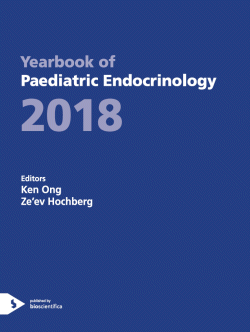13 Global Health for the Paediatric Endocrinologist
Advances in the Diagnosis and Management of Congenital Hypothyroidism
ey0015.13-15 | Advances in the Diagnosis and Management of Congenital Hypothyroidism | ESPEYB15
The five papers included in this section reflect the increasing interest by resource-limited countries in developing such a program but also highlight specific points that need to be considered in countries that embark in this wonderful initiative to make it successful.
S Gowachirapant , N Jaiswal , A Melse-Boonstra , V Galetti , S Stinca , I Mackenzie , S Thomas , T Thomas , P Winichagoon , K Srinivasan , MB Zimmerman
ey0015.13-16 | Advances in the Diagnosis and Management of Congenital Hypothyroidism | ESPEYB15
13.16 Incidence of congenital hypothyroidism in China: data from the national newborn screening program, 2013-2015
K Deng , C He , J Zhu , J Liang , X Li , X Xie , P Yu , N Li , Q Li , Y Wang
ey0015.13-17 | Advances in the Diagnosis and Management of Congenital Hypothyroidism | ESPEYB15
13.17 Assessment of knowledge, attitudes and practices towards newborn screening for congenital hypothyroidism before and after a health education intervention in pregnant women in a hospital setting in Pakistan
B Tariq , A Ahmed , A Habib , A Turab , N Ali , SB Soofi , S Nooruddin , RJ Kumar , A Tariq , F Shaheen , S Ariff
ey0015.13-18 | Advances in the Diagnosis and Management of Congenital Hypothyroidism | ESPEYB15
13.18 Worldwide Recall Rate in Newborn Screening Programs for Congenital Hypothyroidism
L Mehran , D Khalili , S Yarahmadi , A Amouzegar , M Mojarrad , N Ajang , F Azizi
ey0015.13-19 | Advances in the Diagnosis and Management of Congenital Hypothyroidism | ESPEYB15
13.19 Newborn Screening Guidelines for Congenital Hypothyroidism in India: Recommendations of the Indian Society for Pediatric and Adolescent Endocrinology (ISPAE) - Part I: Screening and Confirmation of Diagnosis
MP Desai , R Sharma , I Riaz , S Sudhanshu , R Parikh , V Bhatia




